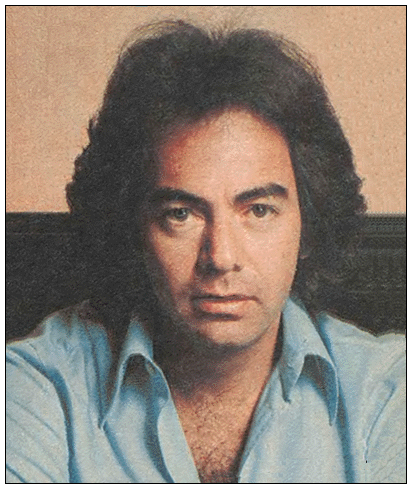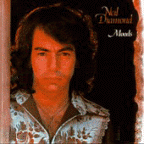|
"Song Sung Blue" Neil Diamond Uni 55326 July 1972 Billboard: #1
The 1976 Greek Theatre concerts where the special was taped were part of a return to live performing for Diamond. The famed "Hot August Night" concerts, taped just one month after "Song Sung Blue" topped the Billboard Hot 100, were followed by a 20-concert stand at the Winter Garden Theatre in New York. At the end of that run, Diamond announced he was taking a leave of absence from performing. "I felt strongly about taking a sabbatical," Diamond told Barbra Zuanich of the Los Angeles Herald-Examiner. "I wanted a normal human existence. I wanted to remove myself from celebrity status... to do things people take for granted, like driving my son to school and having breakfast with my wife. I wanted to re-establish personal relationships with family and friends... to be home for birthdays and Christmas. To make up for times I wasn't around... to stop seeing my life as a juggling act." As it turned out, the sabbatical lasted 40 months, finally broken by his first-ever concerts in Australia and New Zealand. Back home in the United States, he opened the $10 million Aladdin Theater for the Performing Arts in Las Vegas on July 4, 1976. "I had secretly hoped when I finished at the Winter Garden that I would never have to come back and perform," Diamond said in an interview with Robert Hilburn of the Los Angeles Times. "I was exhausted. But then I got itchy about wanting to be in front of an audience again. Besides, being on stage is a real upper." Diamond followed "Song Sung Blue" with two top 20 hits on Uni, "Play Me" and "Walk on Water." Uni was short for Universal and at the end of 1972 the label identity was dropped, along with Decca and Kapp, in favor of an MCA label. Diamond had two more uneventful singles on MCA, then left the company for a five million dollar contract with Columbia Records. His first two singles for Columbia were from his score for the motion picture Jonathan Livingston Seagull. Neither "Be" nor "Skybird" are among Diamond's most memorable hits. His third Columbia single, "Longfellow Serenade," went to number five. Ironically, his best run of hits would be released on Capitol, the label that issued the soundtrack for The Jazz Singer, a 1980 release starring Diamond and featuring his music. Neil had three consecutive top 10 hits from the film: "Love on the Rocks" (number two for three weeks), "Hello Again" (number six) and "America" (number eight). - Fred Bronson, The Billboard Book of Number One Hits, Billboard, 1988.
No comments so far, be the first to comment. |


